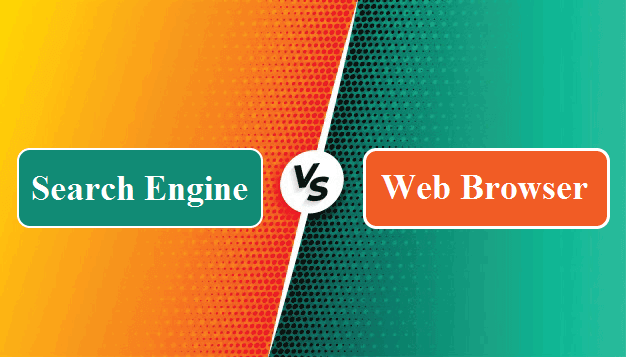Difference between Search Engine and Web BrowserThe search engine and the web browser are two distinct technologies, with the search engine used to find information on the Internet. In contrast, the web browser is utilized to access web pages and HTML files. Some search engine instances include Google, Yahoo, Baidu, DuckDuckGo, etc. On the other hand, there are some examples of web browsers, including Mozilla Firefox, Internet Explorer, Google Chrome, etc. In this article, you will learn about the difference between the search engine and the web browser. But before discussing the differences, you must know about the search engine and the web browser with their advantages and disadvantages. What is a Search Engine?A search engine is a specific type of website that enables users to find data on the Internet. Users enter the necessary keywords into the search field to get the information. After that, the search engine scans its index for relevant web pages and lists them on the screen. The Internet is a huge source of data and resources that may be used to access the resources, and there are various types of software, sometimes known as search engines. This search software includes Google, Duck Duck Go, Bing, Baidu, Yahoo, etc. Components of Search EngineThere are various components of a search engine. Some main components of the search engine are as follows: 1. Crawler These software programs automatically scan the WebPages at regular intervals for keywords, links, and URLs and find the updates. It may navigate the links on a specific webpage. 2. Index The web crawler creates an index of URLs, links, and keywords based on scanning WebPages for effective search results. 3. Search Algorithm The search algorithm is the technology that manages the entire search process. When a user searches for some things in the search engine, it searches for the index and finds WebPages that contain matching keywords. Advantages and Disadvantages of Search EngineThere are various advantages and disadvantages of the Search Engine. Some main advantages and disadvantages of the Search Engine are as follows: Advantages 1. Variety An Internet search may generate huge information sources, providing several resources to get relevant and valuable data from the Internet. A simple Internet search may provide results from online encyclopedias, discussion boards, news pieces, university studies, and even personal blogs. 2. Accuracy Search engines are capable of providing more refined or precise results. 3. Organization Search engines aid in the organization of the Internet and specific sites. It helps to organize the large amount of data that may often be scattered in several places on the same web page into an organized list that may be utilized more easily. 4. Free Access Most search engines, including Bing, Google, and Yahoo, allow users to search for their information for free. Because there are no restrictions on the number of searches in search engines, all end users spend a significant amount of time searching for valuable content to meet their needs. Disadvantages
What is a Web Browser?A web browser is an application software instance designed and developed to get and display data from HTML files or web pages stored on online servers. Sir Tim Berners-Lee developed the first web browser in 1990, and mosaic developed the first graphical web browser in 1993. After that, other web browsers were created. Netscape Communication's Navigator, Google Chrome, Microsoft Edge, Opera, Mozilla Firefox, and Apple Safari are some of them. Characteristics of Web BrowserThere are various characteristics of Web Browser. Some main characteristics are as follows: 1. Interface A web browser employs a graphical interface with toolbar buttons for viewing and moving through documents, conducting manual refresh over a web page, and pausing the ongoing download process. 2. Page Style It may be static or dynamic, depending on the interaction and layout. Static page styles are made up of ASCII text files that have been HTML formatted. The dynamic page style is created using programming languages, including JavaScript and VB Script, which are interactive. 3. Application Integration Web browsers may provide several services on a single platform, such as email, chat, and news. As a result, you may run these online programs through web browsers and search engines to find them. 4. Protocol Web browsers utilize the TCP/IP and HTTP protocols, where TCP/IP protocol is used to perform reliable data transfer within a network. The HTTP protocol aims to allow the user to access or get the webserver and download the HTML content. Features of Web browserThere are various features of the Web Browser. Some main features of the Web Browser are as follows:
Key Differences between the Search Engine and Web Browser
There are various key differences between Search Engines and Web Browsers. Some main differences between the Search Engine and Web Browser are as follows:
Head-to-head comparison between Search Engine and Web BrowserHere, you will learn the head-to-head comparisons between Search Engine and Web Browser. The main differences between Search Engine and Web Browser are as follows:
ConclusionAlthough search engines and web browsers are both related to the Internet, they operate in different ways. On the Internet, the search engine assists in locating the needed content. In contrast, a web browser is utilized to access information from webpages or HTML files stored on servers.
Next TopicDifference between
|
 For Videos Join Our Youtube Channel: Join Now
For Videos Join Our Youtube Channel: Join Now
Feedback
- Send your Feedback to [email protected]
Help Others, Please Share










